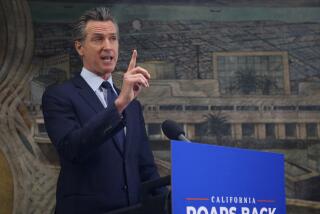State Starts Amnesty Program for Back Taxes
SACRAMENTO — California officials on Tuesday launched a two-month amnesty program that they hope will coax scofflaws to cough up at least $250 million in back taxes.
The general amnesty, the state’s first in two decades, allows individuals and corporations owing income or sales taxes to pay up without being hit with financial penalties or criminal sanctions.
“Tax amnesty is a win-win proposition,” said state Controller Steve Westly. “Taxpayers get a break, and the state gets a boost.”
The amnesty is aimed at the estimated 800,000 individuals and businesses in California that don’t file state tax returns every year, as well as an even larger group of taxpayers that underreports income or overstates deductions.
For most taxpayers, the grace period covers 2001 and 2002. The program follows a recent, more narrowly focused amnesty effort that netted the state $1.3 billion from filers who used so-called abusive tax shelters to improperly reduce their income.
The carrot of paying without punishment is backed by a big stick, officials warned.
Taxpayers must file new or amended returns and make payment plans before March 31 or face a pair of tough new penalties.
The penalty for inaccurately estimating tax liabilities will jump to 40% from 20% of new tax assessments. And delinquent taxpayers who pass on the amnesty program and are later nabbed by state auditors will be hit with a 50% surcharge on accrued interest.
“There are huge penalties for not participating,” said David Rice, a Los Angeles lawyer who sits on the State Bar of California’s income tax committee.
Some businesses aren’t happy about the steep penalties. The California Chamber of Commerce is warning its members that the amnesty program and the stiffer fines “will catch numerous taxpayers unaware, exposing them to extreme financial penalties, even though they have not deliberately failed to pay or report taxes accurately.”
Tax officials downplayed the prospect of problems. John Chiang, chairman of the state Board of Equalization, which administers the state’s sales tax, said the board had plenty of flexibility to deal with unexpected situations.
Westly, who heads the Franchise Tax Board, which handles income taxes, said the amnesty law -- passed by the Legislature and signed by Gov. Arnold Schwarzenegger last year -- might need to be tweaked to “make sure we don’t get anybody caught in the net of unintended consequences.”
The amnesty, Chiang said, represents an opportunity to raise state revenue and pay for needed health, education and environmental programs without raising taxes.
To get that message out, the two tax agencies are spending $2.3 million on a TV, radio, print and billboard campaign to convince people that “paying taxes pays off.”
More to Read
Inside the business of entertainment
The Wide Shot brings you news, analysis and insights on everything from streaming wars to production — and what it all means for the future.
You may occasionally receive promotional content from the Los Angeles Times.











